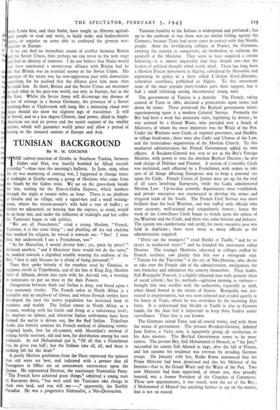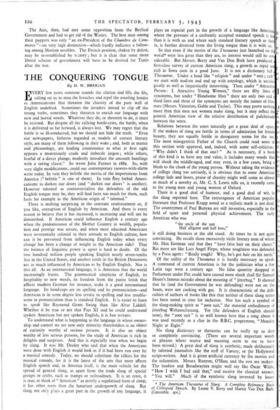TUNISIAN BACKGROUND
By W. M. COUSINS " HE railway-junction'of Graiba in Southern Tunisia, between " We are all Frenchmen," cried a young Moslem, " French, Tunisian, it is the same thing " ; and plucking off the red chefchia that marked his religion, he waved it towards me: " See! I wear that, but underneath I am a Frenchman, too."
" As for Mussolini, I would devour him ; yes, piece by piece! " declared another, " and if Monsieur there would not do the same," he nodded towards a dignified notable wearing the uniform of the Bey, " that is only because he is afraid of being poisoned! "
Then they spoke bitterly of the cruelties used by Graziani to suppress revolt in Tripolitania, and of the fate of King Zog, Moslem ruler of Albania, driven into exile with his day-old son, a warning to potentates to put no trust in the Axis Powers.
Antagonism between Arab and Italian is deep, and based upon a true economic rivalry. The French colon in North Africa is a capitalist and an employer of labour, and where French settlers have developed the land the native population has increased both in numbers and wealth. The Italian comes to North Africa as a peasant, working with his hands and living at a subsistence level ; he employs no labour, and wherever Italian settlements have been formed the native is driven out, like the Red Indian Tripolitan Arabs also bitterly contrast the French method of allocating newly- irrigated lands, free for all-comers, with Mussolini's method of seizing fertile territory, old and new, for distribution among his own nationals. As old Mohammed put it, " Of all . that a Frenchman has, he gives you half ; but the Italians take all, all, and there is nothing left for the Arab."
A. portly MOslem gentleman from the Oasis expressed the opinion that old ways are best, and indicated with a gesture that all Foreigners in Office are an unnecessary excrescence upon the Quran. He represented Destour, the reactionary Nationalist Party. " The French have achieved great things," admitted a young man in European dress, " but wait until the Tunisians take charge in their own land, and you will see—," apparently, the Earthly Paradise. He was a progressive Nationalist, a Nio-Destouriai. Tunisian hostility to the Italians is widespread and profound ; but up to the outbreak of war there was no similar feeling against the Germans, because Tunis had never come in contact with that Nordic people. After• the bewildering collapse of France, the Germans, entering the country as conquerors, set themselves to cultivate the goodwill of the Moslems. They seem to have acquired a certain following—it is almost impossible that they should not—but the leaders of political thought stood warily aloof. There has long been a Moslem Fascist movement in Algeria,.subsidised by Mussolini and expressing its policy in a sheet called L'Action Nord-Africaine, somewhat scurrilous, published in Algiers. To this movement none of the most popular party-leaders gave their support, but it had a small following among discontented young men.
The government of Tunisia is a dyarchy The French, taking control of Tunis in 1881, declared a protectorate upon terms laid down by treaty. These preserved the Beylical government intact, superimposing -upon it a modern Colonial Service. Formerly the Bey had been a weak but autocratic ruler, legislating by decree ; he was assisted by a Grand Wazir, who presided over a bench of Ministers, of whom the most important was the Wazir of the Pen. Under the Wazirate were Caids, or regional governors, and Sheikhs, or village head-men ; there were also Cadis and Ulemas of the Law, and the tremendous organisation of the Moslem Church. To this mediaeval administration the French Government added its own officers. A Resident-General was sent to act as the Bey's Foreign Minister, with power to veto the absolute Beylical Decrees ; he also took charge of Defence and Finance. A system of Controles Civils was instituted, each officered by a Frenchman, with orders to take care of all things affecting Europeans and to keep a paternal eye upon the Caids. French Courts of Justice were set up for the trial of all cases 'involving Europeans, while the Cadis administered Moslem Law. Up-to-date scientific departments were established, and private enterprise was encouraged to develop the mines and irrigated lands of the South. The French Civil Service was more brilliant than the local Wazirate, and was staffed with officials who were accurate, well-trained and scrupulously honest ; hence the work of the Controleurs Civils began to trench upon the sphere of the Wazirate and the Caids, and there was some friction and jealousy. The system was cumbersome and costly, for every executive post was held in duplicate ; there were twice as many officials as the administration required.
" Drive out the strangers ! " cried Sheikh et Taalbi, " and let us revert to mediaeval ways! " and he founded the movement called Destour. The younger Moslems, educated in colleges staffed by French teachers, saw plainly that this was a retrograde step. " Tunisia for the Tunisians " is the cry of Neo-Destour, who desire to take over the French side of the administration, amalgamate the two branches and administer the country themselves. Their leader, Sidi Bourguiba Youssuf, is a highly educated man with genuine ideas of social reform ; but his methods—agitation running to violence— brought him into conflict with the authorities, especially in 1938, when blood flowed in the streets of Sousse. Bourguiba was sen- tenced to imprisonment, but was soon released and resided quietly at his house in Tunis, where he was overtaken by the incoming Axis force. It is understood that Sheikh et Taalbi is also in German hands, for the Axis feel it important to keep these leaders under surveillance. Their fate is not known.
The Germans seized Tunis and all coastal towns, and with them the nexus of government. The present Resident-General, Admiral jean Esteva, a Vichy man, is apparently giving all satisfaction to his Axis masters. The Beylical Government seems to be more restive. The present Bey, Sidi Mohammed el Moncef, or " the Just," succeeded his cousin Sidi Ahmed in 194r, after the fall of France, and last autumn his residence was overrun by invading German troops. On January 17th last, Radio Roma announced that his Prime Minister had been dismissed and also his Minister of the Interior—that is, the Grand Wazir and the Wazir of the Pen. Two new Ministers had been appointed, of whom one, they proudly boasted, was a former President of the Chamber of Commerce. These new appointments, it was stated, were the act of the Bey ; if Mohammed el Moncef has anything further to say on the matter, that is not on record.
The Axis, then, had met some opposition from the Beylical Government and had to get rid of the Wazirs. The best man among their puppets was only " an ex-President of the Chambre de Com- merce "—no very high distinction—which hardly indicates a follow- ing among Moslem notables. The French position, shaken by defeat, may be re-established by vi story ; but it is clear that some more liberal scheme of government will have to be devised for Tunis after the war.



























 Previous page
Previous page